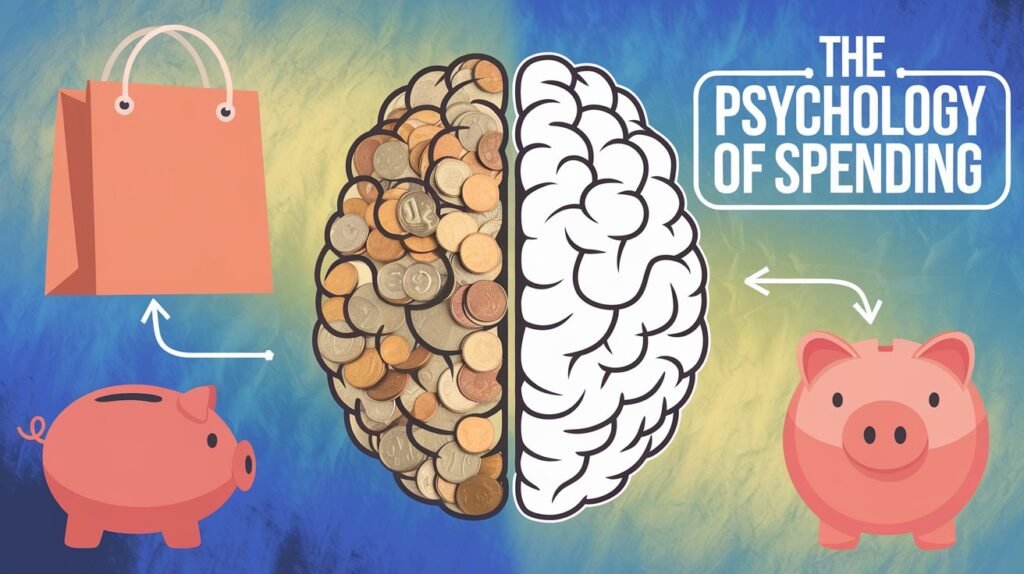Did you know over 60% of people feel guilty after buying something on impulse? This shows how important it is to manage our money wisely. Knowing why we buy things on impulse helps us control our spending. In this article, we’ll share tips to help you spend smarter and shop better, helping you reach your financial goals.

Key Takeaways (The Psychology of Spending)
- Understanding consumer behavior can help you curb impulse buying.
- Creating a budget is essential for effective money management.
- Impulse purchases often lead to regret and financial strain.
- Adopting mindful spending practices can promote healthier habits.
- Identifying triggers for spending can mitigate impulsive behavior.
- Effective shopping lists are tools for smart buying decisions.
- Practicing delayed gratification can enhance your financial well-being.
Understanding Spending Habits
Looking into your spending habits can show you more about how you behave as a consumer. It helps you understand your financial mindset and why you buy certain things. Many times, we buy things without thinking, especially when we’re feeling certain emotions.
Some common spending habits include:
- Shopping in response to emotional states
- Buying items on sale without a need
- Making impulse purchases during social outings
Being aware of your spending is key to a healthier relationship with money. Thinking about your past purchases can help you make better choices. Try keeping a record of what you spend to see what triggers unnecessary buys. This can help you spend more wisely.
Understanding your spending habits lets you take charge of your money. By working on your consumer behavior and financial mindset, you can make choices that fit your financial goals better.
| Spending Habit | Consumer Behavior | Financial Psychology Impact |
|---|---|---|
| Impulse Buying | Frequent, unplanned purchases based on emotional triggers | Can lead to buyer’s remorse and debt accumulation |
| Sale Following | Purchasing items just because they are discounted | Encourages the perception of savings, yet often results in unnecessary spending |
| Social Influence | Buying products to fit in or impress peers | Can foster compulsive shopping due to peer pressure |
The Psychology of Spending: How to Control Impulse Purchases
Understanding why we spend impulsively is key to controlling it. Many things can make us buy on a whim. By knowing what triggers these urges, we can manage our spending better.
Identifying Triggers for Impulse Buying
Impulse buying often comes from certain feelings or the influence of others. To control your spending, look at these triggers:
- Emotional Responses: Stress, sadness, or excitement can make us buy things we don’t need.
- Social Influences: Feeling pressure from friends or seeing them buy can make us want to buy too.
- Marketing Tactics: Ads and sales can make us feel like we need to buy now.
Understanding Cognitive Biases in Spending
Cognitive biases greatly affect how we spend money. Knowing about these biases can help us make smarter financial choices. Here are some important ones:
| Cognitive Bias | Description |
|---|---|
| Scarcity Effect | Thinking products are more valuable when they’re rare, leading to quick purchases. |
| Social Proof | Following what others do, especially when it comes to popular items. |
| Anchoring Effect | Being influenced too much by the first piece of information, leading to wrong financial views. |
By understanding your triggers and biases, you can make smarter spending choices. This knowledge improves your financial mindset and helps you manage money better.
Recognizing Impulse Control Challenges
Understanding how emotions affect your shopping can help you control your spending. Knowing how your feelings lead to spending is key to stopping emotional purchases. By recognizing these triggers, you can start making better financial choices.
How Emotions Affect Shopping Decisions
Emotions play a big role in what we buy. Feeling happy might make you buy things that make you feel good for a while. Feeling stressed or sad can also lead to buying things as a way to feel better.
It’s important to know when these feelings happen and why. For example, shopping when you’re feeling down can lead to buying things you might later regret. Being aware of your emotions can help you control your spending better.
Recognizing Patterns in Consumer Behavior
Knowing your spending habits can show you where you might be overspending. Look at when and why you spend more. Do you spend more when you’re tired, bored, or stressed?
Keeping a spending log can help you see patterns. It can show you when and why you make certain purchases. This information is key to managing your money better.
| Emotion | Impact on Spending | Impulse Control Strategies |
|---|---|---|
| Happiness | Increased likelihood of splurging | Set a spending limit for indulgences |
| Sadness | Tendency for retail therapy | Identify healthier coping mechanisms |
| Stress | Impulse buying for relief | Practice mindfulness before purchases |
| Boredom | Unplanned spending for entertainment | Engage in hobbies or activities |
Strategies for Better Money Management
Mastering money management takes practical strategies and a commitment to change. Effective budgeting is key to controlling your finances. It helps you track expenses and allocate funds for savings goals.
By understanding your budget, you can see your spending habits. This knowledge helps you make better financial decisions.
Creating a Budget that Works for You
When making a budget, think about your income, fixed costs, and what you can spend on extras. A balanced budget lets you:
- Identify and categorize expenses.
- Set limits for non-essential categories.
- Monitor your performance over time.
Using budgeting tools or apps can make this easier. They show your financial status clearly. Regularly check your budget to adjust for income or lifestyle changes.
Setting Savings Goals for the Future
Clear savings goals motivate you to follow your budget. Think about what you want to save for, like an emergency fund or a vacation. Break down your goals into steps:
- Define your specific savings target.
- Determine a timeframe for achieving this goal.
- Identify how much to save each month to reach your target.
As you save, celebrate small wins to stay positive. Linking your budget to savings goals gives your spending a purpose.
Smart Shopping Techniques
Using smart shopping techniques can change how you spend money. One good way is to pause before buying something. Wait a few days to see if you really need it. This helps you make better choices.
Try using cash instead of credit cards. It makes spending feel more real, helping you avoid overspending. Shopping during sales can also help you get things cheaper, sticking to good shopping habits.
Learning about different shopping strategies is smart. It helps you know when to buy and how to use deals wisely. This way, you avoid spending too much on things you don’t really need.
Adding these smart shopping tips to your life can help you manage your money better. By focusing on what’s important and saying no to impulse buys, you can improve your financial health.
Utilizing the Power of Lists
Creating effective shopping lists can help cut down on impulse buying. By planning what you need before you go, you make better choices. This way, you avoid getting sidetracked and stay focused on what you want to buy.
Sticking to your list also boosts your self-control. It helps you say no to things you don’t really need, like those tempting displays. Emotional spending often comes from buying on impulse. A good shopping list keeps you safe from this trap.
To make this habit stronger, try these steps:
- Write down the things you really need.
- Check your list before you shop to keep your focus sharp.
- Stick to your list when you’re browsing the aisles or online.
Using shopping lists regularly will improve your spending habits. You’ll spend less and be more mindful of your shopping. Over time, making lists will become a natural part of your shopping routine. It helps you avoid impulse buys and makes your money go further.

Delayed Gratification and Its Benefits
Delayed gratification is key to managing your money well. It helps you resist the urge to spend now and wait for bigger rewards. This way, you focus on long-term success instead of quick fixes.
Practicing delayed gratification leads to smarter buying choices. It brings several benefits, including:
- Increased savings that act as a financial safety net.
- Less buyer’s remorse, as you pick your purchases more carefully.
- A better money mindset, valuing long-term gains over quick fixes.
Improving your delayed gratification skills boosts your money management and discipline. It changes how you spend and secures a stable future.
Retail Therapy: Understanding Its Impact
Retail therapy can be a quick fix for stress and anxiety. But, it can also hurt your wallet in the long run. It’s a temporary fix that might lead to a cycle of spending you can’t stop. Knowing how it affects you helps you spend smarter.
How to Break the Cycle of Retail Therapy
To stop retail therapy, first figure out why you shop when you’re stressed. Understanding your triggers helps you see patterns. Here are ways to take back control:
- Keep a spending journal to track purchases and the emotions behind them.
- Set a cooling-off period before making any non-essential purchases.
- Identify and challenge negative thoughts that lead to shopping as a coping mechanism.
Finding Alternative Ways to Cope
Looking for better ways to deal with stress can help you avoid shopping. Activities that make you feel good are great alternatives. Try these:
- Engage in physical activity, such as yoga or a brisk walk, to release endorphins.
- Practice mindfulness or meditation to center your thoughts and reduce anxiety.
- Connect with friends and family for emotional support instead of resorting to shopping.
Switching to positive activities can help you manage your feelings without spending too much. This way, you can keep your finances healthy while feeling good.
| Strategy | Description | Benefits |
|---|---|---|
| Spending Journal | Document your emotions and purchases. | Increased awareness of triggers. |
| Cooling-off Period | Wait 24 hours before buying non-essentials. | Helps make rational decisions. |
| Mindfulness | Practice meditation or deep breathing. | Reduces anxiety and fosters calm. |
Making Informed Decisions When Shopping
It’s crucial to make smart choices when spending money. Researching products helps you compare options and choose what you really need. Knowing the difference between needs and wants becomes easier with the right information.
Researching Products Before Making a Purchase
Take time to research before buying. Look at features, prices, and reviews to make better choices. Tools like consumer reports and online reviews offer valuable insights. This helps you make informed decisions.
Determining Necessity vs. Want
It’s key to know the difference between needs and wants. Ask if the item is useful or just appealing. Make a list to sort purchases into needs and wants. This helps you spend wisely and balance your finances.

Adopting Mindful Spending Practices
Mindful spending makes you more aware of how you spend money. It turns every buy into a thoughtful choice, not just a quick impulse. This way, you start to see money as a tool for happiness, not just a means to buy things.
To start mindful spending, try these tips:
- Evaluate Your Emotions: See how feelings drive your spending. Are you buying to feel better or to avoid being bored?
- Set Clear Spending Limits: Make budgets for different areas of your life. Knowing your limits helps avoid buying on impulse.
- Pause Before You Purchase: Wait a bit before buying something. This pause lets you think if you really need it.
- Consider Your Goals: Always think about your long-term money goals. Ask if this buy helps you reach them.
Adding mindfulness to your spending can make you less likely to regret your choices. It helps you understand why you buy things and makes your money choices more thoughtful. This leads to a healthier, more positive relationship with money.
| Mindful Spending Techniques | Benefits |
|---|---|
| Evaluate Your Emotions | Gains clarity on spending motivations |
| Set Clear Spending Limits | Helps maintain financial discipline |
| Pause Before You Purchase | Reduces impulsive buying |
| Consider Your Goals | Fosters long-term financial health |
Practicing mindful spending can improve your financial health. It helps you live more peacefully with your money.
Building a Support System for Accountability
Creating a strong support system is key to financial accountability. Talking to friends, family, or joining local financial groups helps. It makes managing money better and less lonely.
Being open about your financial goals and progress is important. Talking about spending habits can reveal problems you might miss alone. This brings new ideas to how you spend money.
Having a trusted group keeps you on track with your money goals. Regular meetings or talks with your support network can keep you motivated. Here’s a table showing the good things about having a support system:
| Aspect | Benefits |
|---|---|
| Shared Experiences | Fosters understanding and empathy while tackling financial issues together. |
| Motivation | Encourages you to stay committed and motivated towards your financial goals. |
| Feedback | Provides constructive criticism and fresh insights to improve spending habits. |
| Accountability | Creates a sense of responsibility, making you less likely to derail your plans. |
In the end, a good support system helps with financial accountability and builds a community for growth. Use this network to improve your money management.
Conclusion
Mastering your spending habits is a big challenge, but it’s doable. Understanding why you spend and being careful with your choices can really help. Each strategy, like mindful spending and building a supportive network, gives you the power to manage your money better.
Changing your spending habits takes time and effort. But, by spending more thoughtfully, you can reach your financial goals and improve your relationship with money. Keep working at it, and you’ll create a life that values financial health.
Getting control of your finances means making smart choices and sticking to good habits. Use the tips from this article to change your spending ways. This will help you live in line with your values and dreams. Start your journey to financial mastery today!
FAQ
What are some effective strategies to control impulse buying?
To fight impulse buying, start by making a budget that shows your financial goals. Also, write a shopping list before you shop. Waiting a day or two before buying non-essentials can help too.
Being aware of what makes you spend can also stop unnecessary purchases.
How can I identify my spending triggers?
Start by tracking your spending and looking for patterns in your feelings or situations. This might include noticing how ads or certain feelings make you spend more. Knowing these triggers helps you find ways to avoid buying on impulse.
What is the importance of mindful spending?
Mindful spending means paying full attention to your money choices. It helps you think carefully about each purchase. This way, you can avoid buying things on impulse and stick to what’s important to you.
How does emotional spending impact my finances?
Emotional spending can lead to buying things you don’t need, which can hurt your budget. It’s key to understand why you’re spending emotionally. This helps you find better ways to deal with feelings that don’t involve shopping.
What role do cognitive biases play in consumer behavior?
Cognitive biases can affect your buying choices without you even noticing. For example, the scarcity effect might make you buy something just because it’s rare. Knowing about these biases helps you make smarter money choices.
How can I create a budget that works for me?
To make a budget that fits you, list your must-haves, income, and extra spending. Then, decide how to use your money. Make sure to save some and spend on things you want. Check and change your budget as your life or money situation changes.
What are some alternatives to retail therapy?
Instead of shopping to feel better, try other ways like exercise or hobbies. Mindfulness or spending time with loved ones can also help. These activities can make you happy without hurting your wallet.
How can I differentiate between necessities and wants?
Make a list of things you might buy and sort them into needs and wants. Ask yourself if each item is really necessary or if it makes your life better before you buy it.
Why is building a support system important for financial accountability?
A support system keeps you motivated and helps you stick to your financial plans. Talking about your money goals with friends or family can make you more open and accountable. It’s a safe way to share your financial journey.



